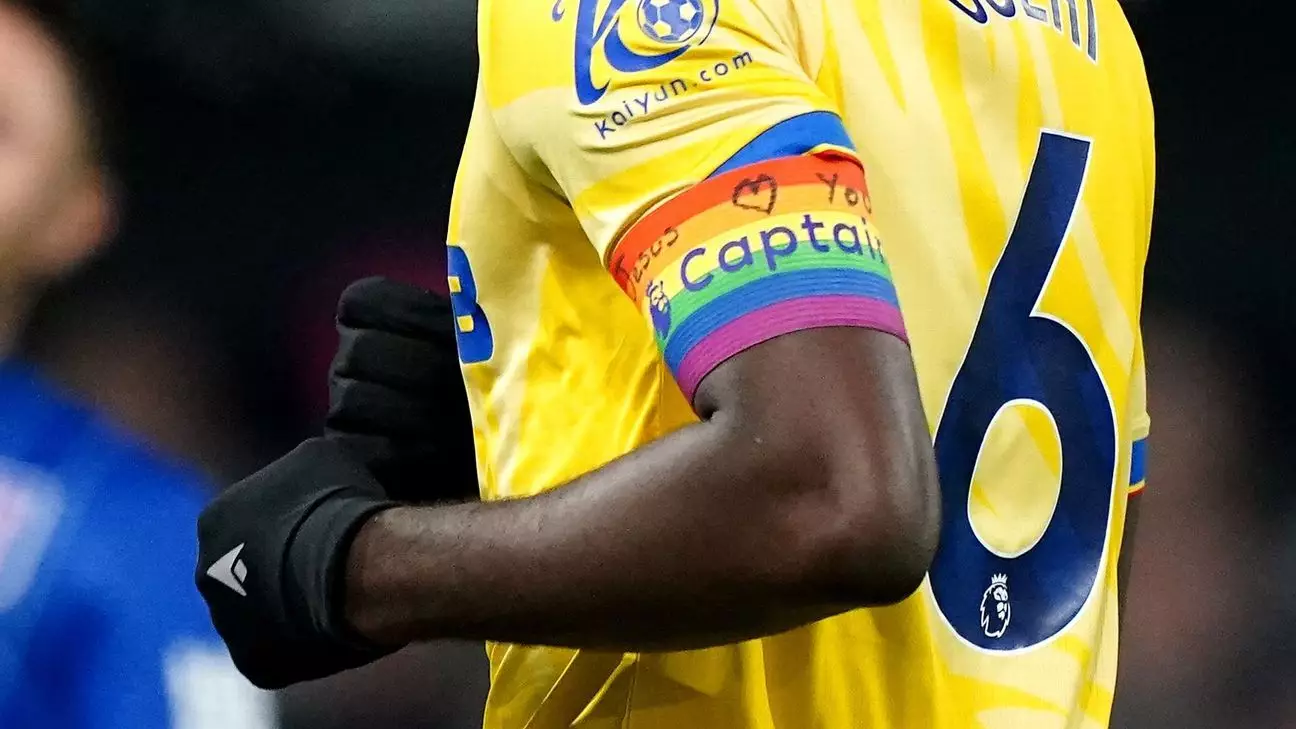The recent incident involving Crystal Palace defender Marc Guéhi has sparked a significant conversation regarding the balance between personal beliefs and team branding in professional football. Guéhi gained attention after inscribing “Jesus loves you” on his rainbow-colored captain’s armband during a match against Ipswich Town. While the England international performed admirably in his team’s narrow 1-0 victory, he was reminded by the English Football Association (FA) of the strict regulations surrounding kit and messaging in the Premier League. This incident poses intriguing questions about the limits of personal expression and the overarching goal of fostering inclusivity in sports.
The FA’s kit regulations are crystal clear, specifically Rule A4, which strictly prohibits any religious messaging or slogans on players’ kits. This rule was intensified following a revision to the Laws of the Game established last summer, mandating that captains must sport armbands that adhere strictly to uniformity without any personal modifications. Guéhi received his first warning just hours before the Ipswich match, highlighting the FA’s vigilance in maintaining decorum and compliance with its regulations. The rainbow armbands, distributed to every Premier League club as part of the Stonewall’s Rainbow Laces campaign, symbolize a collective directive supporting LGBTQ+ rights and inclusivity in sport.
By inscribing a religious slogan on an armband meant to advocate for LGBTQ+ representation, Guéhi raised eyebrows and complicated the narrative surrounding inclusivity. While his intent might have been rooted in a personal expression of love and acceptance, the juxtaposition of his message with the rainbow armband prompted discussions about the impact of religious connotations in spaces advocating for LGBTQ+ rights.
In his post-match remarks, Crystal Palace manager Oliver Glasner attempted to navigate these choppy waters with a lens of understanding and respect for Guéhi’s stance. He asserted that Guéhi is an adult capable of holding his own views and that both the player and the football community value integration and non-discrimination. While Glasner’s comments aimed to highlight individual freedom, they also raise pivotal questions: At what point does personal belief infringe upon a collective identity, especially in a sport striving for inclusivity?
Moreover, this incident exemplifies the delicate dance club managers must perform between player freedom and adherence to overarching institutional guidelines. Glasner’s approach indicated a level of respect for Guéhi’s beliefs but may also leave him vulnerable to scrutiny regarding the club’s alignment with the FA and broader societal expectations for inclusivity.
The notions encapsulated within this situation extend beyond the football field into the wider cultural discourse. Guéhi’s actions and subsequent explanation underscored his belief that love and inclusivity are universal messages. However, the mixed reception of his actions echoes the tension that can exist between religious beliefs and modern societal values. Ipswich midfielder Sam Morsy, who is also known for his religious beliefs, notably refused to wear the rainbow armband during the match, emphasizing that the intersection of faith and activism remains a personal choice. The FA has positioned Morsy’s decision as a club issue rather than a violation of regulations, further complicating the conversation around religious expression in professional sports.
The response from Stonewall highlights the significance of these armbands in fostering an environment where everyone feels welcome and safe. This principle stands in direct contrast to the potential implications of Guéhi’s actions, where individual beliefs may unintentionally undermine collective efforts to promote inclusivity.
As professional sports evolve, navigating the intricate relationship between personal belief systems and broad-based inclusivity remains a challenge. The incident involving Marc Guéhi serves as a microcosm of a much larger conversation—one that asks players, teams, and governing bodies to address how they can foster a culture that embraces diversity without sidelining individual perspectives. The future of sports will require careful negotiation of these tensions to ensure that messages of love, acceptance, and personal beliefs can coexist within a framework that champions inclusivity for all.


Leave a Reply